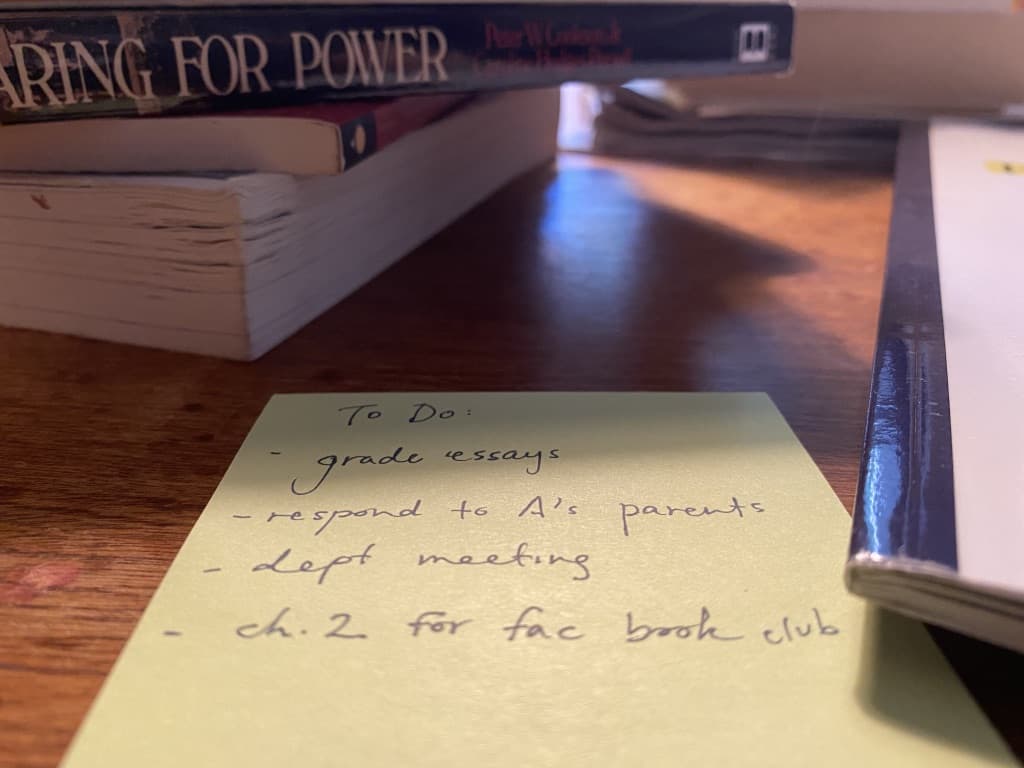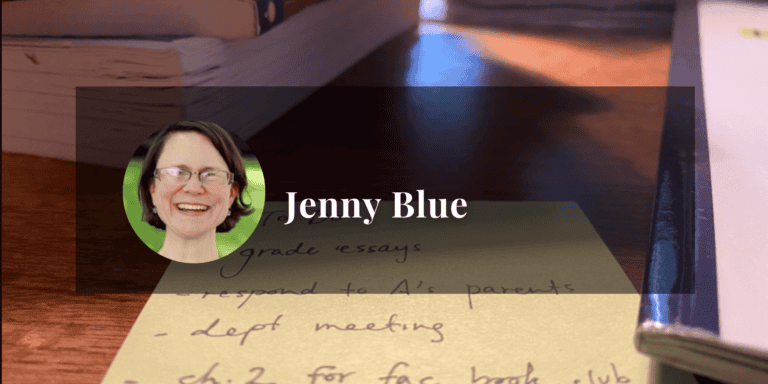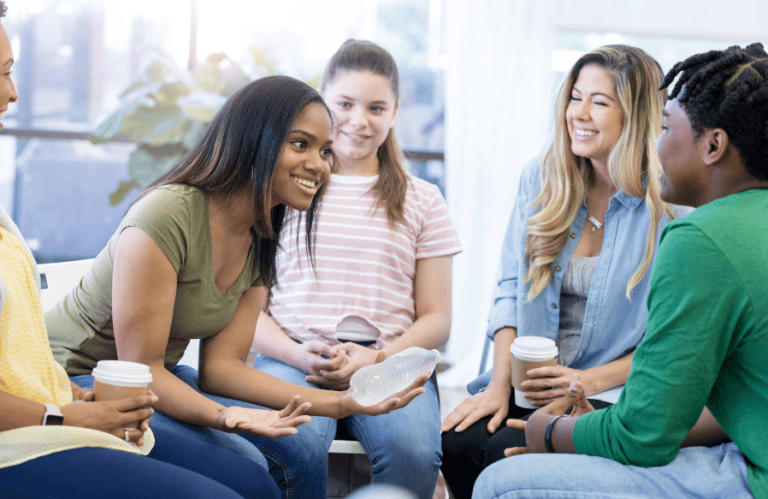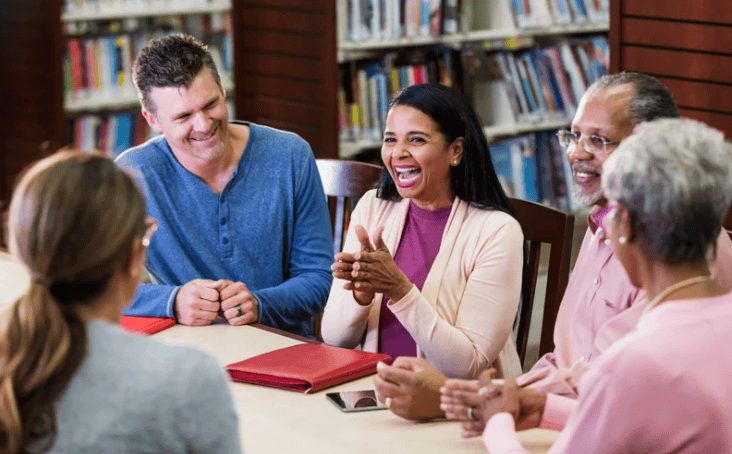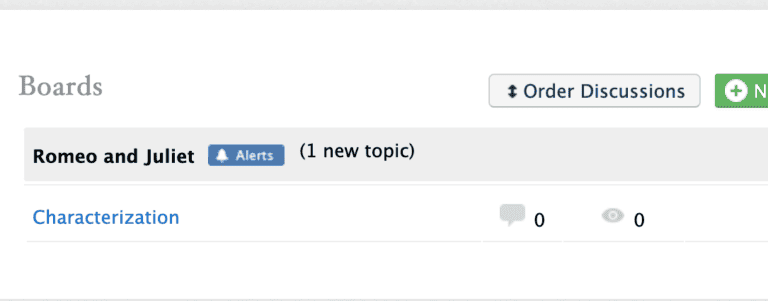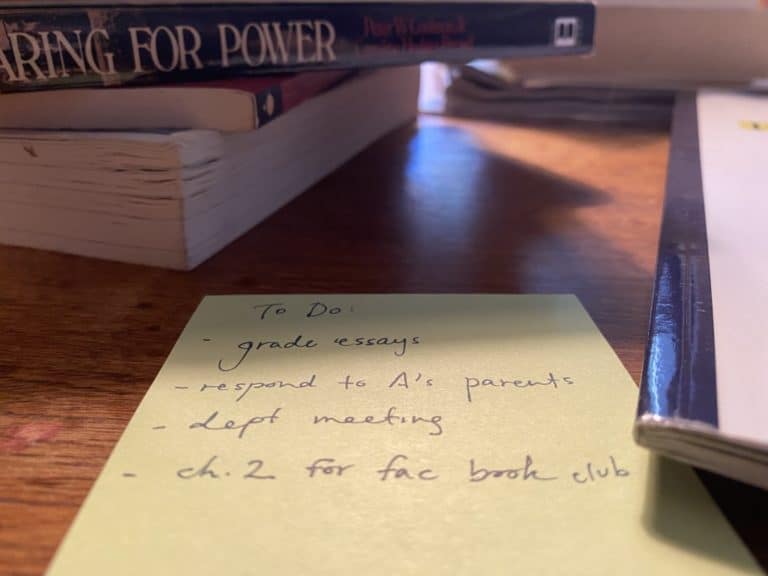Protagonists: 20 minutes with Julia Maxey
The Protagonists series poses a set of questions to teachers who use discussion around the world. This week, we spoke with Julia Maxey, English Teacher and Director of Academic Technology at the Severn School in Maryland.
Hometown: That’s difficult. I’m a military brat. I was raised all over Europe, moving every 2-3 years. But I’ve lived in Maryland for 30 years now.
Favorite teacher growing up: who and why? My favorite teacher was from the freshman year of college. I went to Dominican College in San Rafael, California, and there was a nun called Sister Nicholas. I loved her. She was my advisor. She understood me, and she challenged me a lot. She was very patient, and she knew everything there was to know about literature.
Describe yourself as a student in three words: Curious, assertive (maybe some considered me aggressive – I insisted on learning everything, even if we weren’t supposed to learn it at that point. I probably tried a lot of my teachers), and happy (I was a super happy student. I loved school, loved learning, so much that I just never left).
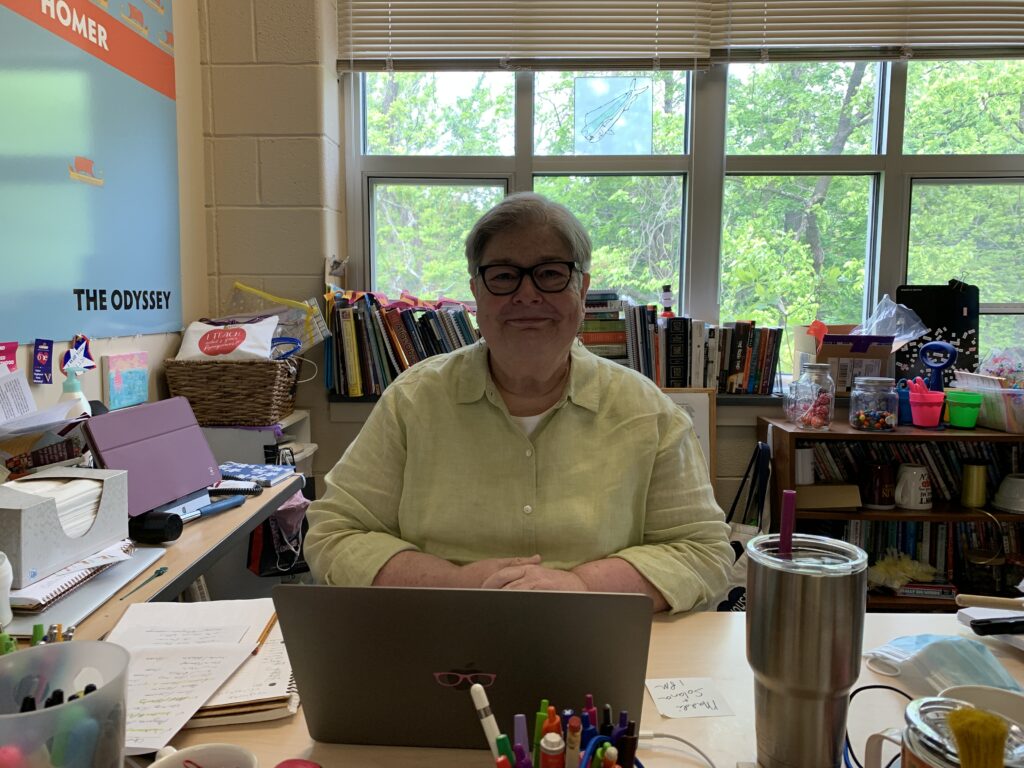
Current City, School, Teaching Assignments I teach at Severn School near Annapolis. It’s a PreK-12 private school with about 800 students. I teach English in the Upper School – I’ve taught for 38 or 39 years – and I also direct academic technology. I teach mainly 12th grade (AP Literature) and sometimes 11th grade, which is junior seminars – Immigrant Literature and Women in American Literature. As Director of Academic Technology, I also work with teachers on using technology. I teach Creative Writing on Malone Schools Online Network (MSON).
Favorite historical figure (or best line from history?) Eleanor Roosevelt comes to mind. She was a fantastically assertive woman. She was so intelligent, and she saw what the country needed and went for it. I love Maud Gonne, who was a great patriot for Ireland at her time. I like how she used her talents in theatre and writing to further the cause of freedom.
Favorite literary character (or best line from a novel?) I’m a huge fan of Toni Morrison, and I love many of her characters. I love Pilate from Song of Solomon. I also love Beatrice from Much Ado About Nothing. I really like Taylor from Kingsolver’s The Bean Trees. I love Elizabeth Bennet from Pride and Prejudice.
Favorite school supply? Pens! I have a thing for pens. I have about seven cups filled with all manner of pens on my desk. The problem is that my classes are pretty paper-free, so I have to make up reasons to use my pens all the time. When I’m writing writing, I write with pencils. But I like pens. I like Papermate Inkjoy pens. I actually keep an old CD holder on the edge of my desk with the pens and pencils I don’t like. Those are the ones I lend out when people are looking for one.
Pet peeve about class (student-led?) discussion? I guess I could say when students don’t participate, but that hardly ever happens, actually. And if there’s a reason, I need to figure it out. So that’s not really a pet peeve. One pet peeve I have is if another student disrespects another student in the class. Sometimes at the beginning of the school year that happens, before they understand my philosophy – I’m pretty quick to call that out and make sure it doesn’t happen again. When a student is brave enough to say something, if someone talks them down, I affirm that we don’t talk to each other that way. With seniors, there isn’t an issue with that, because by the time they’ve gotten there as they’ve been taught since ninth grade they don’t engage that way. The juniors still do that sometimes, and I have to step in and help them to see that that’s not how a discussion works. It’s almost always boys, wanting to take control or draw attention to themselves. At our school, students are trained to draw on the text and ask thoughtful questions, so when they ask a question like “Who does Gatsby love?” I’m not excited. We all read the same book – that’s not a question that’s a discussion question. I get excited when seniors create questions that extend out even from the book and draw problems from it into the world.
Favorite moment of class discussion? First, when a student who is reluctant to speak in class (even though they’re engaged) does. Once there was this student with voluminous notes who was actually commenting, in her notes, on what other people said. I love when that student steps in and wants to say what they have to say. Especially with the seniors, they know and understand that some students don’t want to volunteer, but they actively draw others into the conversation. I also love when they think of other texts and draw them in, asking: “doesn’t this remind you of that book we read last year?” It pulls the discussion beyond a single novel and into the world beyond.
Biggest challenge to good discussion in a virtual classroom? It depends on the grade of the students. Seniors who have been together for a long time, they know how to discuss. It’s very different online. At the start of a virtual class, I do a whole class just talking about the problems of Zoom – the fact that you can’t see body language, can’t read cues, catch people’s eyes during a discussion. On Zoom, you need to find a way to indicate that you have something to say – you can’t jump in in the same way you can in the classroom. The person who spoke last would call on someone with a hand raised, though sometimes I’d have to shift for someone who was overlooked. With my juniors, and in general with groups that haven’t been together for as long, it’s harder. Some people are shy to raise their hands – do I raise while someone’s talking? Do I wait till they’re done? We had practice discussions at the beginning of this year to make sure that people got used to it. I will say that at my school there’s a rule that you have to have video on and sound on – that changes things and makes it easier to run that discussion.
Some 9th grade teachers talked to me about how discussions were extra difficult to transfer online. Kids were uncomfortable on Zoom, and they already didn’t know how to do discussion. They would prompt students the night before to help direct students and help them to react to others. This prepared them to have something to say in discussion. I didn’t do that that often with my older students because they didn’t need it very much. I’m not a huge fan of just online discussion; I prefer voices and face-to-face. The teachers of younger students have to make sure students are fully prepared. Kids aren’t born knowing how to do all of that stuff, so it behooves us to educate them on how it works! For example, I’ll say something like “tomorrow I’m going to ask you about symbols in The Bean Trees. Did you see anything like that when we read The Bluest Eye?” I can be sure, then, that when they come in the next day, they know they have something to say. You have to be very comfortable in a class to have a good discussion.
It’s so much more difficult, in that way, for younger adolescent students. It’s already painful, and the fear of being embarrassed in front of everybody is monumental. I had a really, really shy student one year who was kind of fearful of his own voice. I would send him an email before class and tell him what I was going to ask him, so that I could give him a moment to speak once. The relief on his face was palpable, and he knew he’d done it. You have to know your students pretty well for a good discussion. I can’t imagine leading a great discussion without that level of understanding about each other. A lot of that was bruised by the Zoom experience – it really was not the same. I’m used to teaching online but it’s not the same. Last year at this time, we were entirely remote; at the start of this year, we went hybrid; it went on and off between hybrid and remote. There are things that many of us will keep from that time online, and a lot of that was born out of that preparing students for discussions.
Text you count on to inspire conversation? So many poems! Novels: Toni Morrison (inspires nothing but discussion – all she does is ask questions about life and why it’s like this). Hamlet and Macbeth are my favorite Shakespeares to teach because of the questions he asks. I look for literature that asks good questions – that’s what good discussion is all about. Good literature asks questions about why we are what we are and how we can be better. Lately I’ve been teaching a lot of Native American literature in my classes. My students have almost never read anything by Native American authors; they don’t know about Native American history. These authors ask different questions about humans and humanity and the world than what my students are used to. Those questions lead to fascinating questions. In a similar way, Immigrant Literature really opened new questions to my students – they force students to think differently about the world. My women in Literature class, conversely, doesn’t have so much controversy because the people who sign up for it are already “there.” It’s mostly girls who are actively feminist already, and their eyes aren’t so much being opened for a first time.
What do you nerd out about? Poetry is really big. My students are tired of me telling them that I’m a member of the American Academy of Poetry which just means I give money every year and read a lot of poetry. It’s kind of sad to me when students don’t care about poetry. I also nerd out, sadly, when I find a technical tool that I think is super super cool. Like when I was first introduced to hypothes.is. So many things. Really cool technical tools, and poetry.
What is your wish for this world? All the usual, right now – that people would be healthy, happy, and so on. That people could see others the way they see themselves; that people could get out of themselves a bit. If people were able to do that, many of the ills around us could be solved. People are generally unable to do that.
When historians recount 2020+, what will they be especially fascinated by? Last spring, then going on for several months, and even now in the time of pandemic and uprisings in this country and all over the world, and the way they connect. 1969 was a year of huge upheaval in this country; I think we’re undergoing that same sort of transformation politically, technically. I would say culturally, but I’m not thinking artistically – I feel like we might be in the doldrums in this country, not with literary art but with visual/musical art – it’s all involved with politics. This kind of works with the seeing the world through others’ eyes issue. There are a lot of people who are trying to do that and be allies for others, but that puts in very stark terms the people who don’t want to do that and refuse to do that.
One prediction for the future of schools? I was talking to a friend about this recently. I thought “high school’s going to have to change.” I was thinking more specifically about my school, but also high schools generally. I spend most of my time with seniors. They do independent projects for a month in May instead of class. We ended this internship program with Covid, and now it’s more of a research project. Our seniors are 18 or 19. I have one student who refuses to have a parent call when she needs to be off because she says “I’m a18. I should be able to sign myself out.” And I must say, I agree with her. If she can go to war, she should be able to sign herself out when she has a doctor’s appointment.
I thought: we need to do more to prepare students to be full-fledged adults out in the world. How much math do kids have to have before they go out in the world? How many novels do they need to read? The goal of an education, I think, is to make good, conscientious, thinking people. Maybe we aren’t doing that as much as we should be. Maybe we’re so focused on our disciplines that we’re forgetting the whole end product element – because where they end isn’t just the end of your term or class — the end product is who you are in the world. Did what you did in high school contribute to that in some way? I learned all sorts of things in high school, but I don’t know that much of it made me who I am as an adult. It was the discussions I had about the books, not the books themselves, that shaped me. It’s the relationships I had with teachers.
Best advice given to you by a department chair or supervisor? I think the best advice was “each day is different.” I remember early in teaching, when I’d been teaching for six years at the college level. I think I forgot what I’d been like in high school. I would say to a friend who’d taught high school for a long time: “I don’t know what to do. We’re starting this novel, but they won’t have it read for the end of this week. What do you do in the meantime?” My friend laughed. I was so overwhelmed. When my lessons didn’t go perfectly, I would think: “I’m going to get fired now.” The headmistress of this private school I taught at (before Severn) told me, as I was broken down crying: “every day is entirely different.” If the kids didn’t like you, if you were doing a bad job, everyone would know. Let the small things go, figure out what’s going wrong, and figure out a different way. It’s not the end of the world every time something doesn’t go right.
Even still, every time a lesson I thought would be amazing kind of flops, I’m tempted to be down on myself. But I’ve learned that I can ask students what didn’t work, and they’ll be brutally honest about whether it worked and how. That’s what I like to think: you invested this time, this didn’t work, that’s okay. There’s always another way of doing it. I’ve also learned, over the years, probably from that same headmistress: there’s only so much you can do. You don’t have to rush through everything. Go at their pace. Do whatever they can do. I’m big on planning as I go. I might know, at the start of the school year, what books I’m going to teach, but if there isn’t time, or if I can add something, fine! I have to listen to the students. I’m not going to limit myself. Are you teaching the students, or are you teaching the subject? A teacher at a school said this to me when I said I teach English: “You don’t teach English, you teach students, and you’re teaching them about English.” I thought she was so snobby at the time, but she was so right.
Educator-Influencer you count on? First place you turn for classroom advice? When I was young I got advice from friends who had been teaching for longer. Now a lot of them are retired, and education and kids have changed quite a bit. Now it’s my fellow teachers here at school, not just in my department. I talk to them about what we’re doing and how things are going. I get advice on classroom management, things like that. Every once in a while, I wander and look in other people’s classes: I’d like to see what people are doing in other disciplines. How do they handle their lessons? How are they arranging their desks and table? I just ask.
Better class discussions will _______________. Make the class more engaging for everyone. Not just me, but for the students. They will reveal student understanding. I never give tests or quizzes in my classes – other English teachers do – they don’t reveal much for me. I need to hear students and see what they write.
